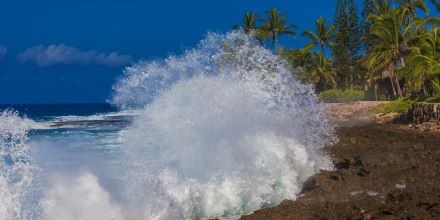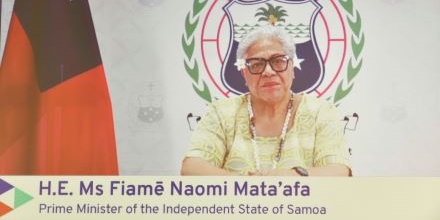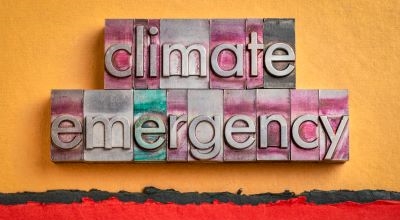Toda's Work Highlighted on UNDP's 'Catching the Last Wave'
Jun 2022 - News
Toda Senior Research Fellow, Dr Volker Boege, was recently interviewed for the UNDP’s 'Catching the last wave’ podcast on climate change, peace and conflict in the Pacific. Listen here to the whole conversation in which Volker gives an overview of Toda’s activities and focus in this area. 26’58” https://www.undp.org/pacific/news/catching-last-wave-volker-boege Image: Willyam Bradberry/Shutterstock
Australia's Pledge on Climate Change Action in the Pacific
Jun 2022 - News
Australia's Foreign Minister has pledged Australia's commitment to taking stronger action on climate after meeting with Samoa's Prime Minister in Apia. Penny Wong's stop in Samoa is the second Pacific country she has visited after Fiji since being sworn in less than two weeks ago. She said the new Australian government was elected with a mandate to be committed to climate change and it understands how important the issue is to Samoa and all Pacific nations. "We are called on to do so now more than ever," she said. Read more at Radio New Zealand International Image credit: International Labour Organization/Flickr
Vanuatu Declares a Climate Emergency
Jun 2022 - News
Vanuatu has become the first Pacific Small Island Developing State to declare it is facing a climate emergency. In a Twitter post, the leader of the opposition Ralph Regenvanu announced parliament passed a 17-point resolution declaring a climate emergency on Friday. Regenvanu said under Point 1 of the resolution, "The Parliament declares that a climate emergency exists that is now existentially imperilling the people, societies and natural resources of the Republic of Vanuatu." He adds "Point 2 further declares that climate change is now undermining the fundamental human rights of present and future generations of Vanuatu's people." The Melanesian nation is among the most climate-threatened nations in the world. Read more at Radio New Zealand International Image credit: marekuliasz/Shutterstock
Labor Climate Policy Pegged as Game-Changer for Australia-Pacific Relations
Jun 2022 - News
The new Australian Labor government's climate change policy has been pegged as a possible turning point for Australia-Pacific relations by Pacific expert Tess Newton Cain. Anthony Albanese's Labor Party was swept into power in Saturday's election — along with a host of climate-focused independents and Greens candidates — while Scott Morrison's Liberal Party was decimated. Dr Newton Cain, the Project Lead for the Pacific Hub at the Griffith Asia Institute, told Pacific Beat that Labor's climate policy, alongside its expressed desire for Australia to host the UN Climate Change Conference with the Pacific, would be well-received. Read more at Pacific Beat, ABC Radio Australia Image Credit: Alpha/Flickr
IET Digital Conversation "Technology for Peace"
May 2022 - News
IET’s Digital Conversations "TECHNOLOGY FOR PEACE" May 27, 2022 | 2.00 – 3.30 pm Expert panellists: Dr Lisa Schirch, Senior Research Fellow, Toda Peace Institute Pranav Bajaj, Co-Founder, Medulance Lyric Jain, CEO, Logically Vignesh Santhanam, India Lead (Aerospace & Drones), World Economic Forum Moderator: Charles Assisi, Co-Founder, Founding Fuel Some of the pressing issues that will be discussed: 1. How does new cutting-edge technologies help in managing relief measures including peace and resolving conflicts? 2. How does technology for peace help resolve communication, aid food supply and mobility? 3. Is India ready to adopt such technologies for peace keeping? 5. How data collected using ICTs can highlight tensions and offer early warnings? 6. Tackling fake news, social media conflict management and the emergence of International Fact-Checking Network (IFCN). 7. How surveillance, drones and satellite mapping account for better visibility? 8. Emergency Services – How predictive analytics algorithms can help? Register for this event here: https://digitalconversations.in/webinars/tech-for-peace




